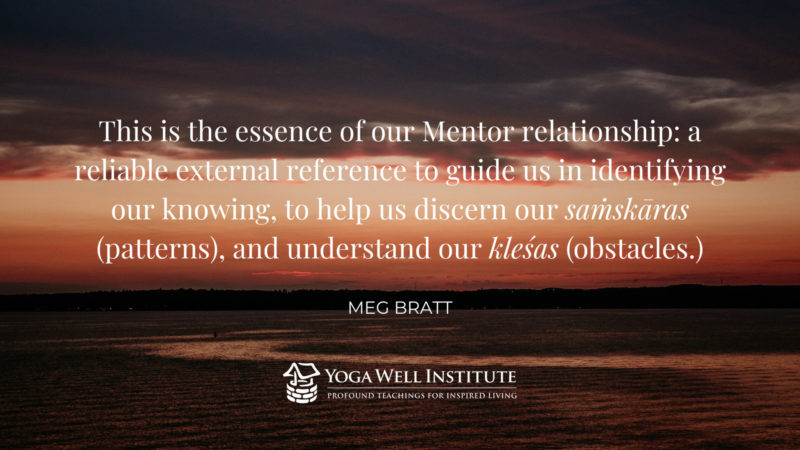When we speak of Mentors at Yoga Well, we mean much more than professional guidance from someone with experience in the field of Yoga Therapy.
In the first chapter of the Yogasūtra, Patañjali offers different practices for reducing agitation so we can see and act with clarity. One practice is seeking counsel from someone wiser, someone who has done (and is continuing to do) their own work of personal transformation (YS I.37.) This is the essence of our Mentor relationship: a reliable external reference to guide us in identifying our knowing, to help us discern our saṁskāras (patterns), and understand our kleśas (obstacles.)

Kriyāyoga (YS II.2), Yoga in, of, and through action, involves svādhyāya (self-study.) We can often get tripped up by our old ways of thinking and doing. When we are agitated or out of balance, it is easy to continue to feed the imbalance or follow the whims of our desires and aversions. As a common example, without guidance we will often choose to practice for ourselves what feels good or what we are familiar with, excluding what we don’t know or don’t like. Sometimes we practice what another teacher suggested long ago, though, as we’ve changed, the tools may no longer be serving us.
As such, the Mentor relationship is a model of the Yoga Therapy relationship.
At Yoga Well, the Mentor’s role goes beyond providing academic and career advice. It goes beyond sharing wisdom for the student working with clients and functional group practicum work. In our training programs, the Mentor also provides a much deeper service: ongoing, regular guidance for the student’s individual journey of self-transformation.
To support our students in finding a Mentor, we provide a Mentor-matching service.
I Want a Mentor
This involves interviewing the student to become familiar with their personality, needs, goals, capabilities, professional interests, and more. It is an important recognition of the depth of the work done in the Mentoring relationship. We do not randomly assign Mentor and student together from a list. Our matching is done with great reverence to the tradition of teaching Yoga.
The basis of the student and Mentor relationship is the student’s Yoga practice. With regular practice, the student and their needs change. So then the Mentor revises the practice according to the develop and new situation of the student. Most importantly, the practice provides the student a way to re-habituate, become more aware, and uncover insights that create personal transformation.
The Mentor is a guide helping to translate the experience and the studies of Yoga philosophy in daily life.
The guidance of this consistent relationship with an experienced teacher aids in the student’s discernment and clarity and is a safe relationship to do deep, personal work. The relationship between the student and the Mentor holds the space for this development as the realizations are shared and explored.
As the student learns to become a Yoga Therapist, they must first apply the learning to themselves. It is imperative to be receptive to the healing one desires to share with others. The Mentor and the student’s personal practice, created and advised by the Mentor, are tools that bring Yogic studies to life.




